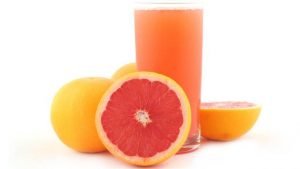Q: There’s a sticker on my prescription bottle that says not to eat grapefruit or drink grapefruit juice. How long do I have to avoid grapefruit when taking my medicine?
– Grapefruit Lover
Some medications are best taken in a particular way: either with food, or taken before meals. Other medicines need to be refrigerated, or shaken well before they are poured out. The label on a prescription bottle doesn’t always have space to include this additional and vital advice, so your pharmacist will use an additional label called an accessory or an auxiliary label to call your attention to this important information.
Some medicines come with an accessory label that talks about grapefruit: “Avoid taking this medication with grapefruit or grapefruit juice”. But it doesn’t say exactly what would happen if you did. What if you forget and have grapefruit juice for breakfast when you take that pill? And how long should you should avoid grapefruit juice after taking it?
Why should you avoid mixing grapefruit juice with some medicines?
Grapefruit juice can change the way your body absorbs certain types of medicines. Most pills dissolve while in your stomach but that’s not where most of the action is when it comes to getting the medicine into your body. The lining of your small intestine is full of blood vessels and special molecules that move vitamins, minerals, nutrients and medicines into your bloodstream, and from there, throughout your body.
One type of special molecule found in the lining of your small intestine is an enzyme that can break apart medicines and change their shape, which then makes them inactive. This enzyme, called CYP3A4, will actually decrease the amount of active drug that you absorb into your body by taking some of it apart before it can be absorbed into your bloodstream. Several dozen medicines are affected by this enzyme, some more than others.
Grapefruit juice is important to this because it contains some natural compounds that will completely inactivate the CYP3A4 enzymes lining your small intestine. After this happens, all of the medicine in your tablet or capsule can now be absorbed into your body, instead of only part of the dose.
Drinking grapefruit juice has an effect similar to taking one and one-half doses every day of your medicine, instead of only one. This extra amount may not be noticeable with some medicines, but with others, especially heart medicines, it could cause you to experience serious side effects or even toxicity.
This “grapefruit effect” was discovered by accident. In 1991, researchers wanted to find out if drinking alcohol while taking a particular medicine would affect someone’s mental alertness or change the concentration of drug in the blood. To measure this, they designed a study in which each participant took the blood pressure medicine felodipine several times, sometimes with alcohol and sometimes without. Then they needed to disguise the samples so that the people in the study wouldn’t be tipped off on which one they were getting, which could affect the results.
The researchers asked themselves, “How can we mask the taste of the alcohol?” and chose grapefruit juice, giving each participant a glass of grapefruit juice with each dose of medicine, with half the samples containing alcohol and the other half just juice.
Then, something curious happened. All of the study participants had much lower blood pressures than the researchers expected to see and dramatically higher blood levels of the medicine they studied than expected from their doses, an average of 50% higher. Drinking alcohol didn’t turn out to have much effect on the blood level of felodipine, but drinking grapefruit juice with it sure did!
Further testing has shown that drinking only 7 ounces (less than a typical glass) of grapefruit juice completely inactivates the CYP3A4 enzymes in your small intestine for up to 3 days. If you happen to be taking felodipine, you’ll get 50% more medicine than the dose prescribed for you by your doctor until the enzymes recover.
This “grapefruit effect” is not the same in everyone. Some people have a smaller number of CYP3A4 enzymes in their small intestine, and some medicines are not as affected by it as others. And if you love other citrus fruit, don’t worry. Oranges, lemons and limes do NOT seem to have this effect on medications and are perfectly safe to have instead of grapefruit.
I’m sorry, but since the effect of one glass of grapefruit juice can last up to 3 days the only way to be completely safe if your medicine has a grapefruit interaction is to avoid grapefruit juice and grapefruit entirely.



